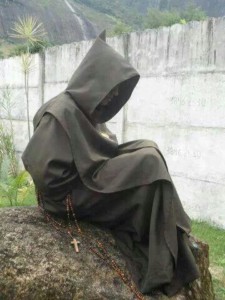I appreciate the feedback I’ve received on the last few posts. It seems clear that more attention to thoughts would be helpful. As I wrote earlier, when we are forced into a situation of isolation and many of our usual supports are removed, we often find ourselves flooded with thoughts. This can be quite distressing especially when our minds “race” or when thoughts are so heavy and (apparently) indisputable that there seems to be no escape from their grim logic. These two particular extremes form the material for the bipolar condition, where a person moves back and forth between a mind going too fast (hypomania or mania) and a mind stuck (depression). I would imagine that many of us are going through mild, or even relatively strong, versions of these conditions right now.
The good news is that monks have been dealing with the challenge of thoughts in solitude for centuries. Our traditional disciplines may offer some profit for readers of this blog.

A book by a fellow Benedictine (with the name Funk–no relation!), available in the monastery gift shop…
We are not our thoughts. This means that it is possible to put distance between our Selves (what the Christian tradition sometimes calls the “true self”) and our thoughts. This in turn allows us some perspective and objectivity regarding our thoughts. Perspective gives us the choice whether to keep the thoughts we have or to replace them with other thoughts. This is extremely significant. Why? Because thoughts determine our worlds. When we are not in control of our thoughts, when they overwhelm us or operate unconsciously, we experience life as beyond our control. Under these circumstances, thoughts can appear to have a kind of necessity about them. But this is, in fact, an illusion that can be dispelled.
While thoughts determine our actions and create our worlds, it is important to note that we are not just our minds. Each of us is an integrated composite of mind, body, and spirit. As it turns out, our bodies can be extremely helpful tools for regaining control of our minds. Anyone who has taken a walk in the last few days has likely felt how much a change in our bodily state can alter our mood and thinking.
One of my favorite movies, Of Gods and Men, tells the true story of the Trappists from Tibhirine, Algeria, during the 1996 Algerian Civil War. Early on in the film it becomes clear that the monks are all likely to die at the hands of extremists if they remain in their monastery. The drama of the story revolves around whether they will stay with their beloved villagers (who are mainly Muslim), or leave (abandon?) the villagers for the safety of France. Once the monks have decided to stay, the superior of the community, Fr. Christian de Chergé, in a voice-over, muses on the importance of routine in the face of growing disorder outside. How were the monks able to face the fear of being kidnapped and eventually being killed without breaking down? The answer is that they simply went about their work each day, praying the office, celebrating Mass, operating a health clinic, and even gardening.
Routines remove a great deal of uncertainty from our lives by eliminating the need to decide over and over again when to rise, when to eat, and so on. Under the influence of routines, the future becomes more predictable and requires less adjustment on the fly, conserving energy for truly important decisions.
Like the monks in the film, we are all under stress right now, and for the next several weeks, routines will be important for managing our thoughts. When the stay-at-home orders first came about, many people seemed to think that this would be like a vacation. All the suddenly available time looked like a gift: a chance to relax, not to shave, and finally to binge-watch that series that we missed the first time around. But if we are really facing at least 4-6 weeks stuck at home, a daily and weekly routine is going to be extremely important. Breaking routine is fun when it’s temporary and when you know that it will return again relatively soon. But weeks without a good routine is a recipe for heightening anxiety and allowing the mind to roam too much. Longstanding monastic tradition requires set times for waking, praying, reading, eating, and cleaning. In our monastery, we’ve found these traditional routines to be particularly comforting and familiar during the stresses of the pandemic. Perhaps readers would profit from making decisions about waking up at the same time every day, following the same grooming schedule that we have when we are working (maybe even taking the time to dress well), regular times for meals, regular times for prayer, for shared quiet and reading, and regular times for recreation or exercise.
Keeping our bodies healthy and fit is important for controlling thoughts as well. It helps to eat nutritious foods moderately (i.e. avoiding too much grazing or snacking). Be careful about your use of sugar and alcohol. If one chooses to have some, make sure to pay close attention to how your body reacts, and in general to the effect nutrition has on your moods. For example, since I turned 40 or so, sugar depresses me. If I do eat sugar, I know ahead of time that it will give rise to certain kinds of thoughts (one common one is a feeling of hopelessness). Knowing that this thought is the product of sugar allows me to catch the thought at its earliest appearance and set it aside. Sometimes, it’s good for me just to sit still for a few minutes and pay attention to my body as it adjusts to the effects of sugar. This again allows me to recognize certain types of impulse (e.g. being overly critical with a brother) as “not objective,” and I can move on.

Silence and stillness allow us to practice “nepsis,” the work of vigilant watchfulness of our thoughts.
Stillness is extremely helpful for sorting out thoughts. This observation comes with a few caveats. If you have not practiced stillness, your early experiences of trying to sit still might seem unendurable. When we slow down our bodies, we reduce external stimuli, and this allows our thoughts to rise to the surface. Some of the thoughts that invade our minds may be rather unpleasant. As uncomfortable as this might feel at first, this is exactly what we want, and so it should not surprise us or make us afraid. By slowing our bodies down, we give ourselves a chance to identify our thoughts before they engage us emotionally. We experience emotions in our bodies. Think about how your body responds when you are angry or uneasy. Our shoulders rise and get tense, or we might feel a burning sensation in our chests, for example. Our heart rate increases when we are frightened. So we know that emotions tend to arise unconsciously in connection with certain types of thoughts, and produce corresponding bodily reactions. The problem is that once the emotions are engaged, it is much more difficult to get distance from the thought.
Let’s look at a subtler example. If I react with anger to a news report, it is often the case that I am not paying attention to how the information I’m receiving is causing changes in my body. I know from experience how anger manifests itself in my body. If I can slow down and notice my anger getting engaged, I can step back from the information that is giving rise to this response and decide whether I want to get angry about it, whether that’s a helpful response or merely a habitual reaction.
The goal in slowing down is to choose the thoughts that influence my mood and behavior rather than being at the mercy of thoughts I just happen to have at the moment (or for the past several days, for that matter). Deep breathing and the recitation of a mantra or a short prayer while sitting still or lying in bed will gain us perspective–eventually–on our thoughts. And this will allow us to choose our thoughts rather than be determined by them.
Choosing thoughts also requires choosing my influences. Here it’s good to notice the connection I’ve made between the effects of mood-altering substances like sugar and the mood-altering consumption of information. In both cases, we might experience that a short-term surge in good feeling (even if that means righteous anger at the news) gradually gives way to a dangerous emotional logjam. One way I have dealt with this is by deciding ahead of time how much news I intend to read (I bear some responsibility for the monastery’s safety and financial well-being, so some engagement with current events seems prudent). Once I’ve used up the allotted time, I turn off the internet and immerse myself in something life-giving: the Psalms and gospels, a great novel or a great movie, beautiful poetry or beautiful music. What type of influences ground you and recharge you? Make time for these.
One last external discipline is charity and compassion toward others. In a monastery, this typically means no mind reading. If a brother seems distracted or upset, I needn’t take it personally, nor need I criticize him or rescue him. If I see a brother behaving in a manner that annoys me, I can go to the next room and ignore it. If I’m criticized, I can try to take it in a good and generous spirit.
Once we get some distance from our thoughts, how do we tell the good ones from the bad ones? This is where I will begin in the next post.